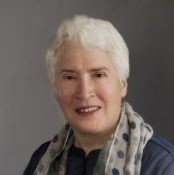
Second Sunday of Lent
♦
Second Sunday of Lent
Anne Morton
March 12, 2019
In the three readings for this Sunday, Abraham, Paul and Peter are each asked to face the future with trust. Abraham, having been told by God in a vision that his ”reward shall be very great,” cries out in despair: “O lord God, what will you give me, for I continue childless, and the heir of my house is Eliezer of Damascus?” [Gen 15:1-2]. In other words, what is the point of a great reward, when I have no son to whom I can bequeath it? God responds by taking Abraham outside and telling him to look at the sky and count the stars, if he can, for his descendants will be as numerous as the stars that fill the sky. And Abraham gazes up at the stars and this elderly man, husband of an elderly wife, believes in God’s promise. “He put his trust in the lord” [Gen 15:6] and not in what his experience and common sense would tell him about the likelihood that he and Sarah would ever conceive a child. The annotation on this passage in The Jewish Study Bible reads:
With nothing more than an extravagant reiteration of the promise of offspring, Abram drops his question. And thus you find, observes an ancient midrash about this verse, “that our father Abraham inherited this world and the world-to-come only as a reward for the faith that he had.” […] In the Tanakh, faith does not mean believing in spite of the evidence. It means trusting profoundly in a person, in this case the personal God who has reiterated his promise. [Berlin & Brettler, 35]
One of those promised descendants was the Apostle Paul. He reminded his readers of this in the opening verses of the third chapter of his letter to the followers of Christ in Philippi. He is “a Hebrew born of the Hebrews…as to righteousness under the law, blameless” (Phil 3:5). It is thought that this letter was written from prison, while Paul was anticipating that he might be put to death [Brown, 493]. He wrote in the profound trust that when death comes Christ “will transform the body of our humiliation so that it may be conformed to the body of his glory, by the power that also enables him to make all things subject to himself” [Phil 3:21].
The fisherman Peter was another descendant of Abraham. He trusts in Jesus from the beginning. We read in Luke’s Gospel [Luke 5:1-11] that after a night of useless toil, since he has caught no fish, Peter obeys Jesus’ instruction to let down his nets once more. He catches so many fish that the nets start to break, and the weight of the fish threatens to sink his boat. Yet Peter does not rejoice in his good fortune. His immediate reaction is to fall on his knees before Jesus, saying, “Go away from me, Lord, for I am a sinful man.” In other words, he tries to kick Jesus out of the boat. Jesus is willing to leave so long as Peter follows him—and Peter does. In this Sunday’s Gospel, Peter wants to stay on the mountain and build tabernacles, because, as he says: “It is good for us to be here.” But Jesus has work to do and so Peter follows him back down the mountain to the world and its sorrows. [Luke 9:37-43]
Like Paul, he follows Jesus to a martyr’s death.
For Reflection and Discussion: Christians have been criticized for a perceived emphasis on doctrine and dogma. Yet, when we recite the Nicene Creed, each of us declares that “I look forward to”* (or “I look for”) the resurrection of the dead, and the life of the world to come” [In Greek – prosdoko , in Latin – expecto ], we are not giving intellectual assent to something so improbable. Like Abraham, Paul and Peter, we are trusting in the One who has promised, “for he who promised is faithful” [Hebrews 10:23].
Bibliography: Berlin & Brettler, ed., The Jewish Study Bible (Oxford, 2004); Brown, An Introduction to the New Testament (New York, 1997).

Starry Night Vincent van Gogh – 1888
Source: Google Arts & Culture

This week’s teaching commentary was prepared by
Anne Morton,
B.A., M.A., M.A. (Theology), Winnipeg, Canada, Bat Kol alum 2010
PLEASE NOTE: The weekly Parashah commentaries represent the research and creative thought of their authors, and are meant to stimulate deeper thinking about the meaning of the Scriptures. While they draw upon the study methods and sources employed by the ISPS-Ratisbonne, the views and conclusions expressed in these commentaries are solely those of their authors, and do not necessarily represent the views of ISPS-Ratisbonne. The commentaries, along with all materials published on the ISPS-Ratisbonne website, are copyrighted by the writers, and are made available for personal and group study, and local church purposes. Permission needed for other purposes. Questions, comments and feedback are always welcome.
Share this with your friends
Share on facebook
Share on google
Share on twitter
Share on whatsapp
Institute Saint Pierre de Sion – Ratisbonne – Christian Center for Jewish Studies
Congregation of the Religious of Our Lady of Sion
Contact us:
secretary@ratisbonne.org.il
26 Shmuel Ha-Naguid Street – Jerusalem
Subscribe to Newsletter

No responses yet